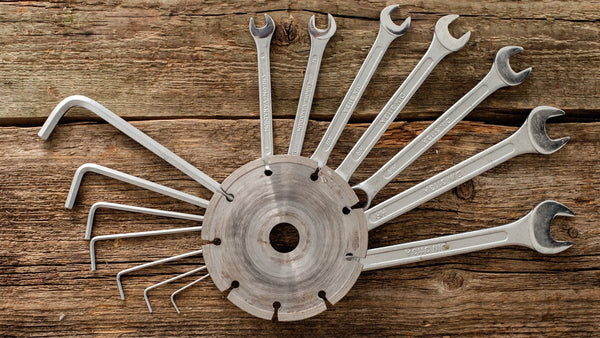Allen vs Hex Wrenches: What’s the Difference and Which One to Use?

Jump to:
If you’ve ever worked on furniture assembly, bike repairs, or machinery, you’ve probably come across an L-shaped tool that slips neatly into socket-head screws. These little guys have been popularized mostly by Ikea, as they come with nearly every set of furniture they sell, but people are still unsure what to call them. Some people call them Allen wrenches, others say hex keys or hex wrenches.
So which is it? Are Allen wrenches and hex wrenches the same thing, or is there an actual difference? The short answer: they’re the same tool, just with different names. But while the differences in name aren’t that important, the differences in standardized sizing systems and brand quality can have a huge impact on your work.
This article will clear up the confusion between Allen vs hex wrenches, explain metric vs SAE sizing systems, highlight the top brands, and help you to decide which type is best for your toolbox.
Are Allen and Hex Wrenches the Same?

This is the heart of the debate. Let’s clear it up:
-
Hex wrench (or hex key): A general term for any tool designed to drive screws and bolts with a hexagonal socket.
-
Allen wrench (or Allen key): A branded name that became generic over time, much like “Kleenex” for tissues, “Hoover” for vacuum cleaners, and “Phillips” for screws and screwdrivers.
The Allen Manufacturing Company from Hartford, Connecticut, was founded in the early 20th century, and they played a pivotal role in shaping modern fastening technology by introducing the tool that combined simplicity, durability, and efficiency.
In 1910, the engineer William G. Allen patented his method of forming screws with a recessed hexagonal socket. At the time, industrial machinery was expanding rapidly, and traditional screw heads like slotted and Phillips posed problems: they were prone to stripping and less effective in high-torque applications (they didn’t have access to the unbeatable JIS screwdrivers back then).
Allen’s design solved these issues by allowing a hexagonal wrench to fit snugly into the screw head, delivering better torque with reduced risk of slippage.
Similar to Phillips with the Phillips’ Head Screw, Allen didn’t actually invent the screw or the driver - he just invented a new way of forming the screws. But somehow, in both cases, their names became synonymous with the fastener.
The newly patented hex socket screw quickly became popular in manufacturing industries, especially in automotive and machinery applications. To produce and distribute these screws and their corresponding wrenches, Allen founded the Allen Manufacturing Company in Hartford. This marked the beginning of what would later be known worldwide as the Allen key.
So this is why most people in English-speaking countries call them Allen keys or Allen wrenches, even though the tools they’re talking about are almost certainly not made by Allen Manufacturing. But whether you call it an Allen key, or a hex key, the tool is the same.
What Are Allen/Hex Wrenches Used For?

Hex wrenches are incredibly versatile. They’re commonly used for:
-
Furniture assembly (IKEA, flat-pack items)
-
Bicycles and motorcycles (adjusting brakes, seats, and derailleurs)
-
Electronics and appliances (tightening casings and mounts)
-
Machinery and automotive (small bolts and set screws)
Their compact design and torque-friendly shape make them indispensable for DIYers and professionals alike, and being able to adjust them millimeters at a time with great control makes them perfect as calibrating screws.
How Are Allen Wrenches Measured?
Allen wrenches are measured by the distance across the flat sides of the hexagonal shaft, not the length of the tool itself. They are typically measured in either metric (millimeters) or SAE (inches) sizes.
Metric vs SAE: Know Your Sizes
One of the most common mistakes when using Allen or hex wrenches is mismatching the size. Even a fraction of a millimeter or inch can lead to stripped screws, damaged wrenches, and a lot of frustration.

Metric Allen Wrenches
-
Measured in millimeters
-
Common in Europe, Asia, and most modern products worldwide
-
Example sizes: 1.5mm, 3mm, 5mm, 8mm
SAE Allen Wrenches
-
Measured in inches
-
Standard in the U.S. and older American machinery
-
Example sizes: 1/16", 1/8", 3/16", 1/4"
Why It Matters

If you try using a 5mm wrench on a 3/16" bolt, it might seem to fit, but the tiny difference can damage both the wrench and fastener. Always check whether your equipment specifies metric or SAE before choosing the tool.
Recently, modern manufacturers are making the switch over to metric to better service the majority of the world. This is a great thing, as some of the best hex wrench brands (like the toolmakers of Japan) use metric, and it sounds a bit silly to say “Can you pass me my five-sixty-fourths-of-an-inch wrench?” When you can just ask for the 2mm.
Top Brands for Allen and Hex Wrenches

When it comes to hand tools, quality matters. A poorly made wrench can round off fasteners, snap under pressure, or wear down quickly. While we’re used to stacking up piles of these that we get for free with flatpack furniture and electronics on Amazon, it’s better to have a quality set from the start. Here are some trusted names in the Allen wrench market:
1. KTC (Kyoto Tool Company)

KTC (Kyoto Tool Corporation) is Japan's leading manufacturer of ratchets and wrenches. Their tools are coveted by automotive enthusiasts and professionals worldwide, and their brand is seen as a fine example of Japanese quality, durability, and exceptional craftsmanship.
Beloved by amateurs and professionals alike, their tools are even used by the Toyota Gazoo Racing Team in the World Rally Championship.
If you want a high-end set of ball-end hex wrenches that the automotive experts trust, you have to choose KTC.
2. Tone Tool

Tone tools have been made in Osaka, Japan since their founding in 1938. Their dedication to high-quality, made-in-Japan tools is unmatched. They exhibited their tools at the first Japanese Automobile Show in 1954, and were one of the early-adopters of the Japanese Industrial Standard (JIS) certification.
If you're looking for extra-long ball-end Allen wrenches, or an 8-in-1 Allen wrench multitool, Tone has you covered.
3. Bondhus Allen Wrenches

Bondhus is known for durability and precision engineering. Their tools are made in the USA and often feature special coatings to resist rust and wear. They’re a go-to for professionals who need tools that can withstand heavy use.
4. Wera Allen Wrenches

Wera, a German manufacturer, brings innovation to the table. Their color-coded wrenches make size identification quick and easy, while their ergonomic design reduces hand fatigue. Wera Allen wrenches are especially popular among mechanics and technicians.
Pair these with a sturdy Trusco Japanese Steel Tool Box to keep your set organized and protected.
Which One Should You Use?
So, when it comes to Allen vs Hex wrenches, the difference is mostly in the name. The tool itself is the same, but the branding and size standards (metric vs SAE) create confusion.
If you’re just starting out, here’s the best approach:
-
Get a complete Allen wrench set with both metric and SAE sizes, or future-proof your toolset by sticking with metric.
-
Choose a trusted brand like KTC or Tone for long-term reliability.
-
Make sure to always choose the correct size wrench, so as not to damage them, or your screws.
At the end of the day, the best Allen wrench is the one that fits your fastener perfectly and holds up under pressure. With the right set, you’ll be equipped for furniture builds, bike repairs, machinery maintenance, and more.

0 comments